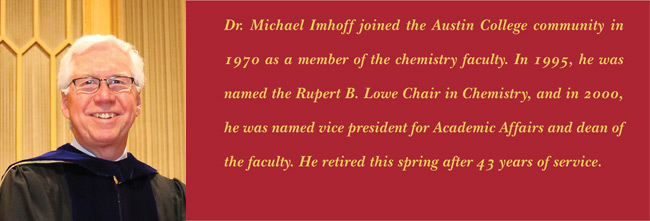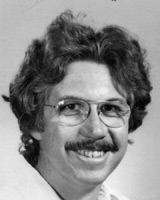
 You have said you came to Austin College planning to stay a few years. What kept you here?
You have said you came to Austin College planning to stay a few years. What kept you here?
I was born and raised in southern California, including my high school and college experience. This shaped my expectations of life after school, both culturally and geographically. In fact, it wasn’t until I went to graduate school in Colorado at age 22 that I met people who had not grown up in a metropolitan suburb or lived more than an hour from the ocean.
My on-campus job interview at Austin College was my first time to visit Texas. It was early April, and the pastel greens of north Texas were welcoming, and I was quite impressed by the caliber of faculty and students I met at Austin College. Janet and I accepted the job offer to move to Sherman. The faculty community was very welcoming, and the educational philosophy of the College made this an exciting place to teach. Although we missed our families in California, we learned to appreciate the special qualities of Texas. The next thing we knew, 43 years had passed, and we are here to stay.
What did you enjoy about teaching?
Teaching was very exciting for me. Through my last year of teaching, I still experienced the nervousness of the first day of class in general chemistry. I loved the engagement that takes place in the classroom and the experience of sharing the “aha” moment with students. Also, the classroom was a pretty heady place to stroke my ego. After all, there are few professions that offer one the opportunity to gather 20 or more students to hear what one has to say about a subject dear to the heart. As a chemist, my challenge was to de-mystify chemistry for the student and present it as a few logical principles that can be applied to explain most chemical behavior. I enjoyed re-working my classes each year, which improved my presentation and helped me appreciate the perspective of students new to organic chemistry.
Was the step into administration what you thought it would be? Has the role been enjoyable?
Initially, from my vantage point, being an administrator looked like lots of work and not much fun. When President Oscar Page asked me to serve as acting VPAA, it was a commitment of only six months to a year. At that point, I did not give much thought to the long-term consequences of moving into administration. As it turns out, I have enjoyed administration quite a bit. I was blessed with the good fortune of serving a patient and supportive faculty, and receiving mentoring from Oscar Page, a very successful president. Oscar and I worked together for 10 years. Most days, we talked informally over coffee and developed an intuitive understanding of each other that made my job much less complicated. I was also very fortunate that Oscar’s successor, President Marjorie Hass, embraces many of the same fundamental educational values. Her enthusiasm is infectious and she has the capacity to energize those around her to take on new challenges. Institutionally and administratively, the future should be very exciting.
What has been the toughest part of your job?
As a professor one of the toughest parts of my job was the awarding of course grades. Like most Austin College faculty, I spent a great deal of time working with students outside of class. Some students in my classes worked incredibly hard, but chemistry never clicked for them, and they ended up with some sad grades. Ironically, I admired many of these students for their great tenacity and discipline and volunteered to write them strong letters of recommendation. Not surprisingly, very few of them took me up on the offer. It is too bad, but many students believe that a faculty member’s respect is tied entirely to their academic performance.
What are the stand-out moments in your Austin College career?
Over a 43-year career there are many more stand-out moments than I have room to report. The three presidential transitions at the College brought excitement and anticipation to the faculty. Each former president had served for many years and had imprinted the College with his personal style of leadership. However, all were student- and faculty-focused, and the changes that came with new leadership were within the framework that we all endorsed. Other stand-out moments include improvements to the campus, such as Wright Campus Center and the IDEA Center. Also, major foundation gifts from the Priddy, Lilly, Mellon, and Keck foundations have given boosts to the Academic Affairs and Student Affairs programs and initiatives such as the Center for Global Learning and Thinking Green have been important additions. Finally, a personal highpoint was playing on the faculty intramural basketball team that took the intramural championship in 1972. We were tough and the Phi Sigs, Betas, and Chi Delts could not understand how a group of “old men” could beat them. So sweet!!!
If you could go back and choose another career, what would it be?
Over my career I have interviewed many pre-med and pre-law students. When you ask them why they want to be a doctor or lawyer, they usually say, “to help people.” I respond, “Well, if you really want to help people, why don’t you become a teacher?” I cannot think of a job potentially more meaningful and gratifying than teaching. You do get to help people. But unlike a physician or attorney, teachers do not have to work with students under conditions of high stress, and therefore, teaching can be much more fun.
At a conference I heard Maya Angelou talk to teachers about their “web of influence.” As I become more senior, I appreciate more this extraordinary role we play at Austin College. We are in constant dialogue with students and occasionally we say something that is very meaningful to a student who then takes those words or actions and passes them onto others … sometimes years later. What is so humbling is that these words may have been incidental and long forgotten by the teacher. But, to that student, those words are as clear as if we said them today.
 What does retirement look like for you? How do you expect to spend your time?
What does retirement look like for you? How do you expect to spend your time?
Retirement is going to be interesting. Janet and I plan to do a lot of traveling, but beyond that I have no solid plans. Since starting kindergarten at McKinley School, my life has been dictated by the academic calendar. I wonder if my biological rhythm is now driven by the tempo of five-day school weeks, followed by Sunday afternoon blues, preparing for Monday morning classes. Superimposed is the yearly calendar of work in the fall and work in the spring. Summer is for vacation, not fall or spring. Without interruption, that has been my calendar since I was 5 years old. I am looking forward to a more spontaneous lifestyle where we can do interesting things regardless of the time of year.
Austin College has been a family affair—your wife and your son are graduates. If it’s a “fit” would you like to see your grandchildren attend Austin College?
Absolutely. Austin College offers the best overall education in the state and students here have greater opportunities to learn and to grow. (Mike and Janet ’86 (MAT ’88) have two adult children, Josh ’93 and Elizabeth, six grandsons, and one granddaughter.)
In Tribute
Last fall, President Hass announced The Michael Imhoff Challenge, offering a 1:1 match for all gifts up to a total of $250,000 to provide laboratory equipment for the IDEA Center. To support this challenge that honors Dr. Imhoff’s impressive career and his instrumental role in the planning and design of the new science facility, make a gift online, or contact Brooks Hull, vice president for Institutional Advancement, at 903.813.2419.
